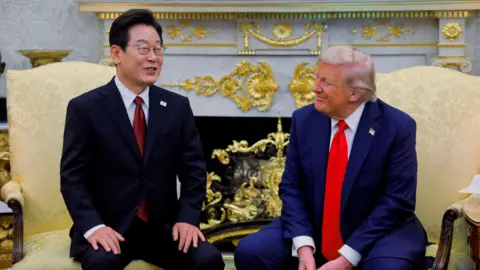South Korea and the United States will hold their first-ever working group meeting on visa policies on September 30, 2025.
The discussions aim to streamline U.S. visa processes for South Korean companies and skilled professionals, removing barriers that affect overseas operations.
Background to the Talks
This initiative follows a high-profile raid earlier in September 2025 at a Hyundai Motor–LG Energy Solution battery plant in Georgia, where hundreds of South Korean workers were detained.
The incident revealed significant visa-related challenges and pushed Seoul to seek solutions that will protect its expanding investments in the United States.
Push for a New Visa Category
South Korea’s Foreign Ministry is advocating for a new visa type designed specifically for Korean professionals.
Unlike the U.S. H-1B visa, which requires employer sponsorship and comes with steep annual fees of up to $100,000, the proposed visa would offer more flexibility and quicker processing.
Prime Minister Kim Min-seok emphasized that the government aims to clarify existing visa systems and, at the same time, design a new option that supports skilled workers.
Investment and Policy Context
South Korean companies are among the largest foreign investors in the U.S., building advanced factories that rely on highly specialized skills.
Seoul has pledged over $350 billion toward American projects; however, visa obstacles and stalled tariff talks continue to complicate progress.
Resolving these challenges could therefore boost business confidence and accelerate investment.
Global Visa Trends
South Korea itself has relaxed visa rules, granting waivers to Europeans, Japanese, and other nationals to attract more foreign investment.
Meanwhile, the United States’ strict H-1B lottery and high costs have driven some global talent to alternatives such as China’s new K visa, which allows jobless entry for STEM graduates.
Challenges with China’s K Visa
Nevertheless, China’s K visa—launched in 2025—faces its own hurdles. It lacks clear residency paths and incentive details.
Additionally, Mandarin dominance in the tech sector and geopolitical tensions, especially with India, may limit its appeal.
Unlike China, which prioritizes repatriating its diaspora with large bonuses, South Korea is focused on drawing in global talent.
Why This Meeting Matters
Clearer U.S. visa rules would strengthen South Korea’s ventures and deepen bilateral economic ties. Consequently, the September 30 meeting could set a model for other countries facing similar skilled labor challenges.
Looking Ahead
If successful, the talks may lead to a new visa quota or policy framework that reduces barriers for Korean professionals.
This outcome would support continued investment and reinforce South Korea–U.S. collaboration throughout 2025 and beyond.
RELATED LINKS: Tesla Urges Trump Administration to Keep Emissions Standards






